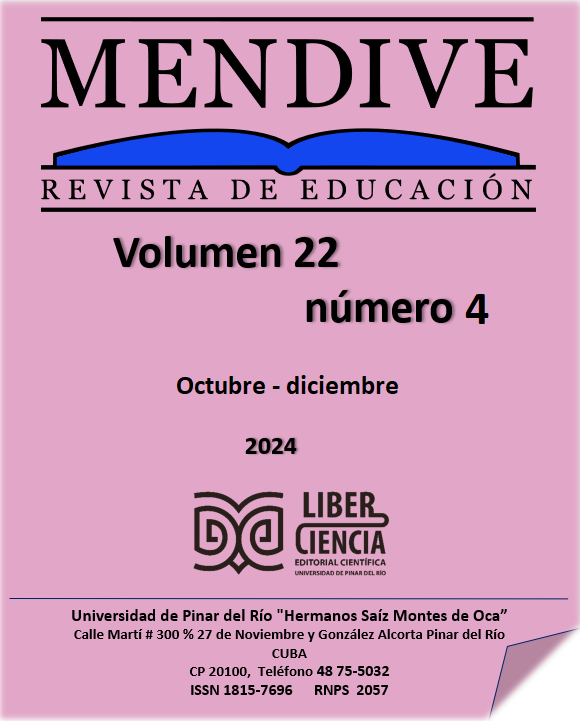Theoretical perspectives of environmental education from educommunication in digital environments
Main Article Content
Abstract
Information and Communication Technologies have a high potential to promote behaviors that counteract the environmental deterioration of the planet. In this context, educommunication, understood as the confluence between education and communication, has gained relevance in digital environments. This review addresses the main theoretical perspectives and the relationship between environmental education and educommunication, with the aim of socializing the theories that support these processes to transform teaching and learning in a world mediated by technology. The research has a mixed approach and a non-experimental, descriptive, field design, focused on a dialectical materialist perspective. Theoretical methods such as historical-logical analysis were used, which allowed studying the background and theoretical perspectives of environmental education from educommunication in digital environments and the systemic-structural method, which approached research as an interrelated unit. In addition, documentary analysis, analysis and synthesis, induction and deduction techniques were applied. Among the main results, a significant evolution in environmental education was noted, from conservationist approaches to comprehensive strategies that include sociocultural and technological aspects. Several trends in this evolution were identified, such as the move from an isolated reaction to a defined political strategy, and from practice disconnected from theory to a focus on praxis. These elements facilitate the effective implementation of environmental education in a hyperconnected world and promote greater community participation and the integration of public policies and institutional programs.
Downloads
Article Details

This work is licensed under a Creative Commons Attribution-NonCommercial 4.0 International License.
References
Aguaded, J. I. (2012). La educomunicación: Una apuesta de mañana, necesaria para hoy. Aularia, 1(2), 259-261. https://dialnet.unirioja.es/servlet/articulo?codigo=3970464
Anzorena, Ó. (2013). El arte de comunicarnos: Conceptos y técnicas para una comunicación interpersonal efectiva. Ediciones Leal. https://books.google.com.cu/books/about/El_arte_de_comunicarnos.html?id=hXiRnQAACAAJ&redir_esc=y
Barbas, Á. (2012). Educomunicación: Desarrollo, enfoques y desafíos en un mundo interconectado. Foro de Educación, 14, 157-175. https://dialnet.unirioja.es/servlet/articulo?codigo=4184243
Bedoy, V. (2002). La historia de la Educación Ambiental: Reflexiones pedagógicas. Educar (Guadalajara, Jal.) 13. 8-16 https://biblat.unam.mx/es/revista/educar-guadalajara-jal/articulo/la-historia-de-la-educacion-ambiental-reflexiones-pedagogicas
Bello, C. (2019). Comunicación efectiva desde la gerencia educativa. EPISTEME KOINONIA, 2(3), 24-40. https://dialnet.unirioja.es/descarga/articulo/7276113.pdf
Chévez Reynosa, N. A. (2021). Educomunicación, alfabetización digital y calidad en programas de postgrados virtuales en la región centroamericana. Universidad de Huelva. https://doctorado-comunicacion.es/ficheros/doctorandos/H121.pdf
Ferrés, J., & Masanet, M. J. (2017). La eficacia comunicativa en la educación: potenciando las emociones y el relato. Comunicar, 25(52), 51-60. https://doi.org/10.3916/C52-2017-05
Hernández Guerra, U. M., Márquez Marrero, J. L., Pérez Viña, V. M., & Rojas Valdés, A. (2021). Estrategia para la gestión de la comunicación institucional en función del desarrollo local. Cooperativismo Y Desarrollo, 9(1), 155178. https://coodes.upr.edu.cu/index.php/coodes/article/view/332
Kaplún, M. (1997). De medios y fines en comunicación educativa. Chasqui, 58, 4-6. https://dialnet.unirioja.es/servlet/articulo?codigo=4337372
Márquez, D., Hernández, A., Márquez, L., y Casas, M. (2021). La educación ambiental: Evolución conceptual y metodológica hacia los objetivos del desarrollo sostenible. Revista Universidad y Sociedad, 13, 301-310. http://scielo.sld.cu/scielo.php?script=sci_arttext&pid=S2218-36202021000200301
Mateus, J. C., Andrada, P., & Quiroz, M. T. (2020). La formación docente en educación mediática en Latinoamérica. En I. Aguaded y A. Vizcaíno-Verdú (Eds.), Redes sociales y ciudadanía: Hacia un mundo ciberconectado y empoderado (pp. 445-452). Ediciones Comunicar. https://doi.org/10.3916/Alfamed2020
Muñoz, P., García, R., & Aguaded, I. (2020). La Educomunicación en la documentación pública, privada y académica colombiana en su comprensión de la cuestión social. Revista Fuentes, 22, 1-13. https://dialnet.unirioja.es/servlet/articulo?codigo=7440568
Novoa, A. (1980). Conceptos básicos sobre comunicación. CATIE. https://comunicatewithme.files.wordpress.com/2012/01/formas-de-komunicacion.pdf
Sena, W. R., Barrientos, A., & Cabezas, M. (2019). La Educomunicación en el contexto de alfabetización de personas jóvenes y adultas en América Latina: Estado de la cuestión a partir de una revisión bibliográfica sistemática. Revista Latina de Comunicación Social, 74, 133-171. https://doi.org/10.4185/RLCS-2019-1325


